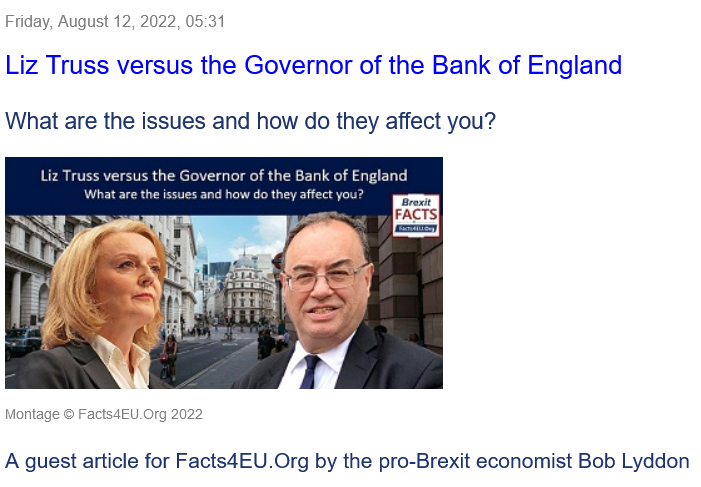Blog published on 18 August 2022 based on an article published on www.facts4eu.org on 12 August 2022
A major change in the financial management of the UK is needed. The current upsurge in inflation may have been triggered by energy prices, but the seedbed for it has been in the creation since the Global Financial Crisis (GFC) of 2007/8. Policy formulation has receded into a nether world of the Treasury and its counterparts working through G-7, into central bankers’ clubs – The Bank for International Settlements (BIS) and The Financial Stability Board (FSB) – in which the Bank of England (BoE) collaborates with its peers, and into a ‘concert party’ of commercial actors lobbying through a hydra of intermediaries, trade bodies and individuals. These actors operate both through visible organizations like UK Finance and Pay.UK, and also by controlling numerous committees like the Payment Systems Regulator (PSR) Panel, the PSR Digital Payments Initiative, and the Chancellor’s/BoE’s Central Bank Digital Currency (CBDC) project’s Engagement Forum and Technology Forum. The ‘concert party’ is expert at voting itself into power.
This is serving the UK badly, via high general inflation, high house prices, expensive payments (taken as Visa and Mastercard deductions), and insecure payments (Authorised Push Payment Fraud).
This lamentable failure on the basics has been enabled by ‘central bank independence’ and by the degree of self-regulation tolerated by the Financial Conduct Authority (FCA) and the PSR, where actions are designed collaboratively in committees with representation from the ‘concert party’ and from…well…the ‘concert party’. For example, seats for representatives of UK consumers on the PSR Panel, the PSR Digital Payments Initiative and the CBDC Engagement Forum are occupied by one Spanish journalist with close links to SWIFT, the banks’ cooperative for international transfers. Another member of both the PSR Panel and the PSR Digital Payments Initiative is there to speak for the financially excluded but is a creation of Mastercard.
The independence of the BoE from government is sham: the BoE has helped the Treasury finance the UK’s increasing debts and at low interest rates. In exchange the BoE has been permitted to create the seedbed for the current inflation: low interest rates, Quantitative Easing and a resolute denial of the early indicators of inflation.
The BoE’s claim that the UK banking system is now more resilient than before the GFC is a fiction: resilience is self-certified by banks using methodologies emanating from the BIS club and verified by the FSB club. Outside that closed world we have Monte dei Paschi di Siena, boasting a very healthy ‘BIS capital ratio’ on the strength of these methodologies but bankrupt.
The discrepancy between the fake world of the BoE/BIS/FSB and the real one is most stark in understating banks’ risk on mortgage lending, which has ballooned again and which, with (i) the BoE’s low interest rates (ii) the BoE’s refinancing of banks’ mortgage loans and (iii) the Chancellor’s stamp duty holiday, has underpinned an upsurge in prices to a level where the only way is down. But the BoE allows banks to hold almost no capital against their mortgage loan portfolios because the BIS’ methodologies show the risk of loss as very low, a position the FSB endorses.
The BoE has constantly set its interest rates below inflation, favouring borrowers over savers, stoking house price inflation, reducing the buying power of savings over time and contradicting the traditional role of a central bank – but then the BoE has another shelf-full of papers from the BIS and FSB to endorse what it has been doing, as it has for the merits of Central Bank Digital Currency. This has all served the UK very badly. Not only the mandate of the BoE needs to be altered, but so does that of the Treasury, its relationship with the BoE, the way the BoE works with the financial services industry, the roles of both the FCA and the PSR, and the archipelago of panels dealing with important issues where the ‘concert party’ is very strongly represented and end-users very poorly. The well-being of the UK demands that this entire eco-system be disbanded and established afresh based on first principles.

